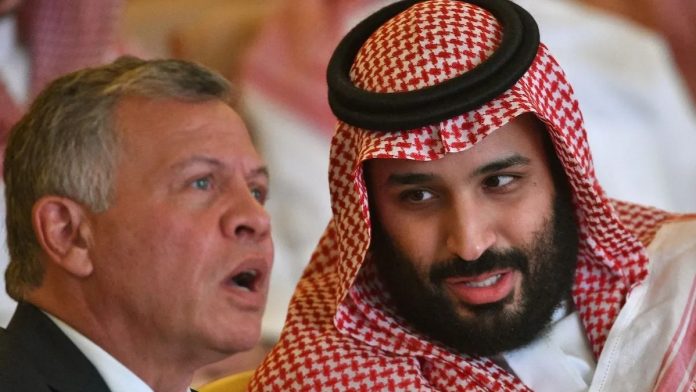A recent exposé by Germany’s international broadcaster Deutsche Welle has unveiled a troubling contradiction in the foreign policy of two key Arab nations—Jordan and Saudi Arabia.While publicly denouncing Israel’s attacks on Iran, both countries are allegedly cooperating behind the scenes to bolster Israel’s defense mechanisms.
On June 13, Israel launched airstrikes on Iran, triggering international outrage. In response, 21 Arab and Muslim-majority nations, including Jordan and Saudi Arabia, issued a joint statement from Doha condemning the strikes and warning of a “dangerous escalation” that could destabilize the entire Middle East.
Yet despite their strong rhetoric, Jordan confirmed intercepting Iranian missiles and drones headed toward Israel. Jordanian officials claim this was purely an act of self-defense, stating that some projectiles posed a threat to their own civilians. However, many observers view this as indirect military support to Israel at a time when it faces regional backlash.
Saudi Arabia, meanwhile, has not made any public admissions but is widely believed to have shared radar intelligence with Israel and allowed access to its northern airspace—providing strategic advantages against Iranian missile threats.
This duality—public condemnation versus covert assistance—has sparked intense criticism from within their own populations. In Jordan, where a significant portion of the population is of Palestinian descent, including Queen Rania, the contradiction is particularly glaring. The government has been aggressively pushing the narrative of “national self-defense” to avoid backlash. But with rising domestic tensions and the recent ban on the Muslim Brotherhood, public trust is dwindling.
In Saudi Arabia, the contradictions are similarly stark. Although the kingdom officially referred to Iran as a “brotherly nation,” experts argue that Riyadh’s mistrust of Tehran runs deep—fueled by years of rivalry, the Yemen conflict, and proxy confrontations. Despite the recent thaw in diplomatic relations, Saudi Arabia’s alignment with the United States and growing unofficial ties with Israel suggest a prioritization of security over public sentiment.
These conflicting actions have raised questions about the credibility of Arab states’ public positions. While citizens across the Muslim world remain fervently pro-Palestinian and deeply skeptical of Israel, many of their governments appear to be making quiet compromises—risking a widening gap between leadership and the people.
As youth across the Arab world grow more politically conscious, the demand for consistent and principled foreign policy grows louder. If Arab governments continue to speak one way and act another, they risk not only regional credibility but also internal unrest.




